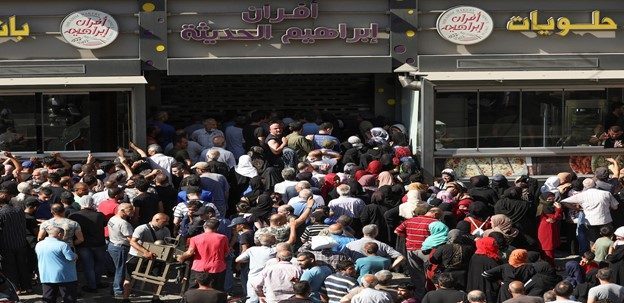
Lebanon reportedly needs around 40,000-50,000 tons of wheat to meet local market needs
Lebanon’s bakery union on Wednesday warned of a bread crisis in the Arab country as several wheat mills halted operation due to lack of funding, reported Anadolu Agency.
In a statement, the Bakeries Syndicate said bread bakeries face a shortage of wheat flour in several Lebanese areas.
“A number of bakeries have stopped making bread, while others have limited quantities of wheat flour that are sufficient for only one day,” it added.
The union blamed Lebanon’s Central Bank for the crisis.
“Banque du Liban is delaying the payment of wheat shipments for unknown reasons,” he alleged.
There was no comment from the Central Bank on the claim.
Lebanon needs around 40,000-50,000 tons of wheat to meet the local market needs. The Arab country imports around 60% of its wheat needs from Ukraine and Russia, which launched a war on its neighbor in February.
Since late 2019, Lebanon has been grappling with a severe economic crisis, including a massive currency depreciation as well as fuel and medical shortages.
The Lebanese currency has lost 90% of its value, eroding people’s ability to access basic goods, including food, water, healthcare, and education, while widespread power outages are common due to fuel shortages.
Parts of grain silos collapse
Meanwhile, parts of the grain silos at Beirut Port collapsed just days before the second anniversary of the massive explosion that damaged them.
On Sunday, parts of the grain silos at Beirut Port collapsed, just days before the second anniversary of the massive explosion that damaged them, sending a cloud of dust over the capital and reviving traumatic memories of the blast that killed more than 215 people, Reuters reported.
The agency said there were no immediate reports of injuries.
Lebanese officials warned last week that part of the silos; a towering reminder of the catastrophic 4 August 2020 explosion, could collapse after the northern portion began tilting at an accelerated rate.
A fire had been smouldering in the silos for several weeks which officials said was the result of summer heat igniting fermenting grains that have been left rotting inside since the explosion.
The 2020 blast was caused by ammonium nitrate unsafely stored at the port since 2013. It is widely seen by Lebanese as a symbol of corruption and bad governance by a ruling elite that has also steered the country into a devastating financial collapse.
One of the most powerful non-nuclear blasts on record, the explosion wounded some 6,000 people and shattered swathes of Beirut, leaving tens of thousands of people homeless.
The Lebanese Minister of Transport and Public Works in the caretaker government, Ali Hamie, told Reuters he feared more parts of the silos could collapse imminently.
Environment Minister Nasser Yassin said that while the authorities did not know if other parts of the silos would fall, the southern part was more stable.
The fire at the silos, glowing orange at night inside a port that still resembles a disaster zone, had put many Beirut residents on edge for weeks.
There has been controversy over what to do with the damaged silos.
The government took a decision in April to destroy them, angering victims’ families who wanted them left to preserve the memory of the blast. Parliament last week failed to adopt a law that would have protected them from demolition.
First Ukrainian grain shipment to Lebanon
Meanwhile, the Turkish Ministry of Defense issued a statement Monday saying that the ship “Razoni” departed from the Ukrainian port of Odessa for Lebanon.
A UN statement said the Razoni was carrying more than 26,000 tonnes of maize. The Turkish Defense Ministry said the ship is expected to arrive in Istanbul on the 2nd and will be allowed to travel to Lebanon after being checked.
After coordination between Turkey and the United Nations, Turkey, Russia, Ukraine and the United Nations signed an agreement in Istanbul on July 22, aiming to reopen the blocked Black Sea transportation route, and ships carrying food can safely travel to and from three ports in southern Ukraine, so that the grains stranded in Ukraine must be transported to the international market.
Both Russia and Ukraine agreed that neither side would attack the ships carrying agricultural products. In addition, the Quartet representatives agreed to establish a joint coordination center in Istanbul to ensure the implementation of the agreement.



